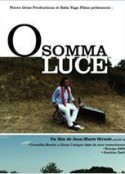
转自:http://www.filmlinc.com/nyff/2010/views-from-the-avant-garde-friday-october-1/views-from-the-avant-garde-jean-marie-straub
“The end of paradise on earth.”—Jean-Marie Straub
The 33rd verse and last chant of “paradise” in Dante’s Divine Comedy. The film starts with verse 67, “O somma luce…” and continues to the end. “O Somma luce” recalls the first words uttered by Empedocles in Danièle Huillet and Jean-Marie Straub’s 1987 The Death of Empedocles—“O himmlisch Licht!…” (O heavenly light!). This extract from Hölderlin’s text is also inserted into their 1989 film Cézanne.
“O somma luce” invokes utopia, or better still “u-topos,” Dante, Holderlin, Cézanne… the camera movement, recalling Sisyphus, in the film’s long shots, suggests its difficulty.
In O somma luce, with Giorgio Passerone’s Dante and the verse that concluded the Divine Comedy, we find at the extremity of its possibilities, the almost happy speech of a man who has just left earthly paradise, who tries to fully realize the potential of his nature. Between the two we find the story of the world. The first Jean-Marie Straub film shot in HD.
So singular are the textual working methods of Straub-Huillet, and now Straub on his own, that it is hard to grasp how far reaching they are. Direction is a matter of words and speech, not emotions and action. Nothing happens at the edges, everything is at the core and shines from there alone.
During the rehearsals we sense a slow process by which ingredients (a text, actors, an intuition) progress towards cohesiveness. It is, forgive the comparison, like the kneading of dough. It is the assembling and working of something until it becomes something else… and, in this case, starts to shine. Actually it’s very simple, it’s just a question of opening up to the light material that has been sealed up. Here, the process of kneading is to bring to life and then reveal. The material that is worked on is speech. So it is speech that becomes visible—nothing else. “Logos” comes to the cinema.
The mise en scène of what words exactly?
The process of revealing, “phainestai”; “phainomenon,” the phenomenon, is what take splace, what becomes visible to the eye.
Is “Straubie” Greece?
This mise en scène of speech, which goes beyond a close reading of the chosen text, is truly comes from a distant source.—Barbara Ulrich
![狄仁杰之通天帝国[电影解说]](https://img.lzzyimg.com/upload/vod/20231116-1/368b81ccaab607e6c8c73d022c74e657.jpg)
http://site.douban.com/108331/ 狄仁杰之通天帝国豆瓣小站
武则天(刘嘉玲 饰)登基之前,修建了高达三百尺的通天浮屠。竣工之前,却先后发生命案:工部侍郎贾颐、大理寺卿薛勇(刘金山 饰)相继自焚而亡。监工沙陀(梁家辉 饰)称此二人因动通天柱之灵符而遭天谴。大理寺少卿裴东来(邓超 饰)、武后贴身侍卫上官静儿(李冰冰 饰)奉命调查,但国师陆离却指点此案需狄仁杰(刘德华 饰)查办。武后下旨,入狱八年的狄仁杰获释任钦差负责此案,却遭刺客袭击。所幸其早有防备,加之上官静儿陪护,得以脱身。狄仁杰排除了怀疑对象琅琊王李宵(姚鲁 饰),并拒绝了其对抗武后之约。狄仁杰发现,死者身中赤焰金龟之毒,遂带领裴东来、上官静儿夜访鬼市,希望从昔日太医汪驴口中获得真相,不想遭遇埋伏,疑似国师显身,杀手集结,令三人难以脱身。然而,一番缠斗之后,案情似乎有了水落石出的转机……